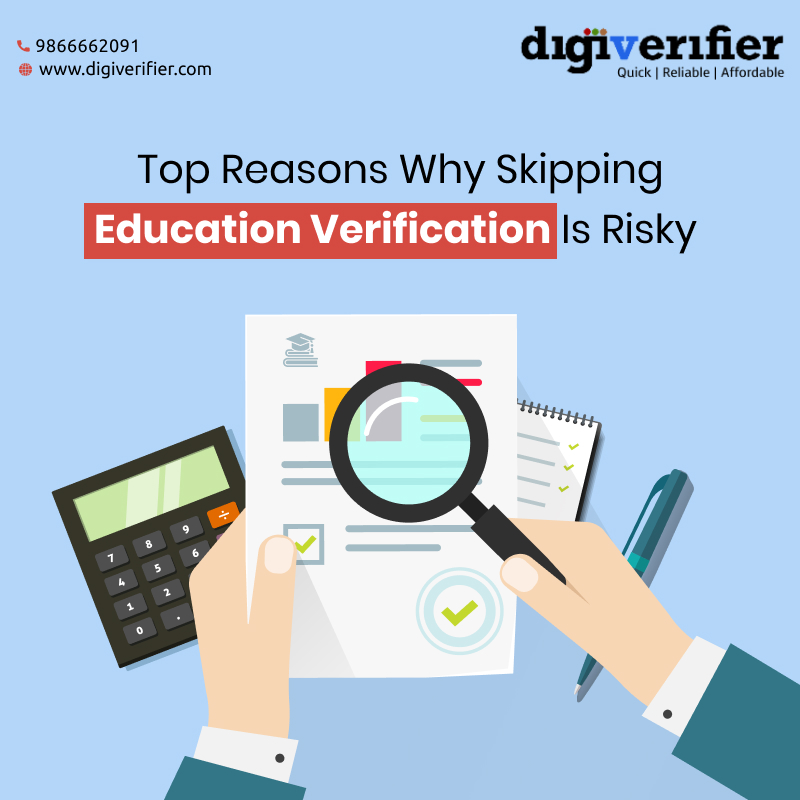Why Skipping Education Verification Can Cost Employers Big Time?
 April 3rd, 2024
April 3rd, 2024
The job market is becoming increasingly competitive, and as a result, candidates are resorting to various unethical approaches to secure a job. In such a scenario, without a proper screening process, most employers find that they have been duped, and they have ended up having #badhire. While this is an unfortunate scenario, to prevent it, more and more companies are investing in digital BGV and dismissing the old manual background-checking method.
While it is suggested that employers invest in comprehensive background checks, many skip important verification steps. For instance, employers often overlook educational verification and make a big-time mistake. To conduct a successful screening of employees, employers must understand that many degree mills that are unaffiliated are churning out degree holders at different levels, plus candidates also embellish their resumes to present a rosy picture. All these can cost recruiters heavily. In this blog, let’s understand how skipping educational background verification can hurt the verification process.

Top Reasons Why Avoiding Education Background Checks Can Cost Employers
Misrepresentation and Fraud:
Education credentials form an essential part of a candidate’s qualifications for any role. By bypassing education verification, there is a risk of misrepresentation or fraud from candidates who might exaggerate their educational accomplishments to get employed. In a fresh study, it was found that 70% of workers lie on their resumes. Hence, not verifying the qualification credential can result in recruiting individuals who are not suitable, as they might not possess the needed abilities and understanding for their work. Educational verification performed by digital solutions such as Digiverifer can help employers verify the educational credentials provided by applicants.
For instance, recently, a client approached Digiverifier, saying they were being asked to pay Rs. 20,000 to have their educational history checked out at an accredited university. Digiverifier assisted in obtaining the data quickly and cheaply, at a cost that was 80% less than what the university had requested.
Legal and Compliance Risks:
Employers must make sure that the information submitted by applicants is correct and lawful. If they don’t verify education, it can lead to legal or compliance problems for an employer, especially in industries where there are specific requirements such as educational qualifications mandated by law. For example, employers not confirming a doctor’s medical degree or certificate might cause serious legal issues if they get hired for a healthcare job. This could lead to lawsuits against the employer, along with heavy fines and damage to their reputation.
Impact on Organisational Performance:
When candidates are hired based on their fake and inflated educational credentials, it can harm the performance of an organisation. Workers who don’t have the needed qualifications might find it hard to fulfil job needs, which could decrease their productivity and cause poor job performance. This may result in financial losses for the business too. Additionally, hiring less qualified people might upset team balance, which could provoke morale problems and lessen employee commitment.
Damage to Reputation:
In today’s digital era, reports concerning employee misconduct can rapidly proliferate across diverse online channels. Failure by employers to diligently verify educational credentials before recruitment can damage the organisation’s reputation and shape stakeholders’ opinions on the brand, including customers, clients, and shareholders. A single error in the hiring procedure poses a high risk of eroding trust and loyalty, impeding the recruitment of top-tier talent and retaining steadfast clientele.
With the help of educational verification under digital background verification, employers can safeguard the company from such mishaps.
If you are thinking about why you should prefer digital educational background verification over a manual process, then find out the reasons here.
Loss of Trust and Credibility:
Workers are the main support of any group, and trust builds the base for the relationship between employer and employee. When people who apply learn about others they work with or bosses being employed because they lied about their qualifications, it impacts trust among the workforce while also reducing the company’s credibility as an honest and fair employer. Losing this trust can result in serious effects such as more people quitting jobs, trouble finding good candidates for job positions, and less loyalty from workers.
Conclusion
To reduce these risks and protect their benefits, employers need to take on a comprehensive digital BGV process that includes complete education verification. By using solutions based on technology like automatic check systems and safe databases, the verification procedure can be made more efficient while lessening administrative load, as well as guaranteeing the precision and genuine nature of applicant qualifications. Moreover, teaming up with trustworthy background-checking providers who are skilled in verifying education can give employers peace of mind and trust in their hiring choices.
To sum it up, checking if an applicant’s education is real or not is a very important part of the background verification process. It helps companies make sure they hire qualified and honest people who have the skills and knowledge needed for their job. The dangers connected to employing candidates without properly checking their educational qualifications are much more serious than any perceived advantages of speeding up hiring procedures. Through adopting digital BGV solutions and giving attention to education confirmation, employers can decrease the risks associated with hiring procedures and safeguard their status in the business world while at the same time strengthening a competitive team ready for success during this digital era. For comprehensive or customised background verification, one can reach out to the Digiverifier team.
